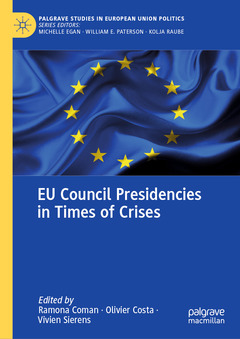Description
EU Council Presidencies in Times of Crises, 1st ed. 2024
Palgrave Studies in European Union Politics Series
Coordinators: Coman Ramona, Costa Olivier, Sierens Vivien
Language: English
Subject for EU Council Presidencies in Times of Crises:
381 p. · 14.8x21 cm · Hardback
Description
/li>Contents
/li>Biography
/li>Comment
/li>
The Council of the EU is a powerful institution whose centrality has been challenged by the Treaty of Lisbon. More than ten years after this major institutional revision, this book examines its role within the EU political regime and its interactions with other institutions. It explores how the Council Presidency has navigated major crises over the past decade and addressed internal challenges. The various chapters discuss key timely questions: How has the relationship between the Council and the European Council evolved over time? To what extent have the recent crises reshaped the relationship between the Council and the European Parliament, as well as its interactions with the Commission? Is the Council Presidency still a powerful mediator? What are its internal challenges? What are the prospects for the rotating presidency system?
Chapter 1: Introduction: The Council Presidency in EU studies: what have we learned and what has changed in the decade of crises?.- Chapter 2: Theorising the presidency of the Council.- Chapter 3. The legal regime applicable to the Council Presidency: competing conceptual approaches and pragmatic solutions.- Chapter 4. The Procedural Legacy of Two Years of Covid-19 pandemic. How the Temporary Modification of the Council’s Rules of Procedure Became Permanent.- Chapter 5. The 2009 transition from the rotating to the permanent presidency of the European Council.- Chapter 6. The European Council and the rotating EU Council Presidency: patterns of cooperation and rivalry beyond the formal treaty rules.- Chapter 7.From mediator to crisis manager: evolving relationship between the Council Presidencies and the European Parliament in times of crisis.- Chapter 8. The Commission is always ready to help’: the ambiguous relationship between the European Commission and the Council Presidency in the Ordinary Legislative Procedure.- Chapter 9. Presiding in the shadows. The rotating Council Presidencies as structures of opportunity for the legitimization of the European Union.- Chapter 10. Still the Dealmaker? The Council Presidency in EMU Michele Chang and Raquel Ugarte Díez.- Chapter 11. Article 7 TEU on the agendas of the Council’s rotating presidencies: Still a “nuclear option” or rather “a talking shop”?.- Chapter 12. How does the Council legitimise the EU’s response to international crises?Emotion Discourse Analysis of the High Representative’s communications onRussia’s war of aggression.- Chapter 13. Does the Presidency of the Council still have the means to achieve its ambitions? The French Presidency 2022 and the promotion of EU sovereignty.- Chapter 14. Rotating Presidencies, Rotating Sponsors? Corporate Sponsorship of the Presidencies of the Council of the EU under Scrutiny.- Chapter 15. Conclusion. The rotating presidency of the Council: a major actorof the EU that is here to stay.
Ramona Coman is Professor in Political Science at the Université libre de Bruxelles, member of the CEVIPOL and Emeritus President of the Institut d’études européennes, Belgium.
Olivier Costa is Research Professor at the CNRS, CEVIPOF, Sciences Po (Paris), France. He is also Director of European Political and Governance Studies at the College of Europe (Bruges), Belgium.
Vivien Sierens is a Belgian diplomat. Holder of a PhD in political and social sciences (ULB & VUB), he is also an associate researcher at the Université libre de Bruxelles (CEVIPOL), Belgium.

